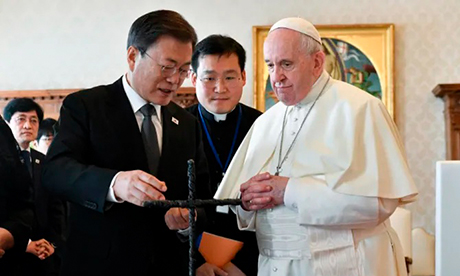On Friday, South Korean President Moon Jae-in met Pope Francis, presented him with a cross made from barbed wire, and urged him to visit North Korea.
Moon, a Catholic, was in Rome for the G20 summit of world leaders and held private talks with the pope for about 25 minutes, the Vatican said.
The cross given to the pope is one of 136 crosses created from melted-down barbed wire from the demilitarized zone (DMZ) representing the 68 years that the Korean peninsula has been divided.
An accompanying message written in Spanish expressed the South Korean president’s hope that the crosses would be a symbol of peace.
“Just as the barbed wire’s thorns and razor blades melt in the fire to become a beautiful cross, I am hopeful that we can forever melt that iron barrier that separates our hearts. I pray devoutly that this cross will take deep root and peace will flourish,” the note said.
Moon’s office said the president had told Francis that a papal visit to Pyongyang would help revive the peace process.
“If you send me an invitation, I will gladly go to help you, for the sake of peace. Aren’t you brothers who speak the same language? I’m willing to go,” it quoted the pope as saying.
The Vatican said that the two sides discussed “the promotion of dialogue and reconciliation between Koreans” and the hope that “joint effort and goodwill may favour peace and development in the Korean peninsula, supported by solidarity and by fraternity”.
When he met the pope in 2018, Moon relayed a verbal invitation from North Korean leader Kim Jong Un to Francis for the pontiff to visit North Korea.
Vatican officials said at the time that the pope, who has made many appeals for rapprochement between the two Koreas, would consider such a trip under certain conditions if it could help the cause of peace.
“If the pontiff visits North Korea when an opportunity arises, it will be momentum for peace on the Korean Peninsula,” Park Kyung-mee, the presidential spokesperson, said that Moon told the pope on Oct 29.
North Korea’s constitution guarantees freedom of religion as long as it does not undermine the state.
But beyond a handful of state-controlled places of worship – including a Catholic church in the capital Pyongyang – no open religious activity is allowed and the authorities have repeatedly jailed foreign missionaries.
